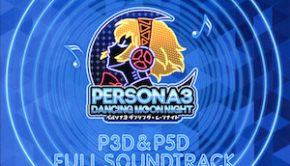Persona 4 -Arena Ultimax- Original Soundtrack
 |
Album Title: Persona 4 -Arena Ultimax- Original Soundtrack (Persona 4 The Ultimax Ultra Suplex Hold Original Soundtrack) |
| Record Label: Mastard Records |
|
| Catalog No.: LNCM-1070 |
|
| Release Date: December 17, 2014 |
|
| Purchase: Buy at CDJapan |
Overview
Persona 4 Arena Ultimax Original Soundtrack (or Persona 4 Ultimax Ultra Suplex Hold Original Soundtrack in Japan) is the soundtrack for the second fighting game spin-off of Persona4. The new compositions were this time handled solely by Atsushi Kitajoh. The soundtrack is very similar to the previous entry’s, having new vocal themes, many short jingles, and new stage tracks that again focus heavily on rock styles with some dashes of Persona music flair.
Body
Shihoko Hirata and Lotus Juice sing the new theme song, “Break Out Of…”. The accompaniment is mostly energetic rock with some strings, with a few sound distortions here and there that spice things up. It does lean a bit on the generic side, but it’s dynamic and catchy enough to be enjoyable. The key change for the last chorus felt a bit awkward, though. There is also a shorter instrumental version of the track, with an electric guitar taking the lead vocal line. “Break Out Of…-Free Mix” is a remix that closes out the album, leaning much more on synths and electronic stylings. It’s not quite as bombastic, but I think it works very well for the track, especially the chorus. It has a bit more attitude than the original, and is a nice alternate version of the track to have. The other vocal track of the album is the credits theme, “Today”, sung by Yumi Kawamura. It is surprisingly much more upbeat than I might have thought given previous ending tracks for series, but it works. Unfortunately it’s still rather generic and not as catchy as previous themes, but I quite like the accompaniment with its focus on piano and strings. Not the best vocal themes from the series, but they work fine.
As with the previous album, there are an abundance of short cues included, many of which last much less even than a minute. There are short rock riffs such as “Bring It”, “PU09”, and “Interruption”, but this time there are also other atmospheres included as well. “PU02” for example is slower and ominous with just piano and strings, while “PU06” takes themes even slower with the same and brings some mystery. “PU05” brings a bit of noir jazz to the sound. Unfortunately just as before, these tracks are really too short to make any lasting impression, and don’t really add to the album at all, even interrupting the flow at times.
The album also includes a number of new stage tracks, and they try for the most part to bring a bit more variety to the plethora of rock tracks, though it doesn’t always work too well. “Mr. Easy-Going Man” is the first of these, starting with the basic rock foundation but them switching up lead instruments as it goes, from synth to brass. Unfortunately the switches can actually feel a bit jarring at times, not just due to the instruments but also the disjointed composition underlying them. “Pink Sniper” is a better, feeling more cohesive and closer to Persona4 stylings with a strong dose of pop and jazziness thrown in. Its melodies still aren’t that strong, but it is a step in the right direction. “Youthful Spirit” is a brighter track, but it feels a bit empty at times, with too many instruments doubling up on the main melody. Then there is “Twinkle Star” which completely eschews the rock for an electronic dance number. It’s a fun track, especially when the brass comes in, but it ultimately comes across as fluff, not being very memorable. “XOXO For You” is similar, but with a few different instruments, though it leans on the more annoying side of cutesy. These tracks do help break the rock mould set by the previous album while keeping the energy up, but it doesn’t rise above average fare.
The better of these tracks starts with “A Fool or Clown?”, making a better use of the gambit of instruments available. The piano and brass actually make a great compliment to the darker rock underlying the song, helping it stand out. “The Joker” features a much better use of the electronic elements than the other tracks do, supporting the rock sound for a harsher feel, and this track too manages to use its supporting jazz instruments properly. The aggression and ultimately finds its climax with “Blood Red Moon”, with an edgier sound overall, sticking mainly to the rock and focusing on the electric guitar throughout. “Blood Red Moon -Blade Mix-“ is included at the end. It’s quite similar but it has a slightly different sound to it, slightly faster and with a sharper sound. There’s a bit more room for development and there’s a decent guitar solo in it as well to give a more complete structure. One of the highlights of the album is “The Battle For Everyone’s Souls ~USH ver.~”, which is the only remix of a previous Persona track. The base of this track is the same as the original rock Persona3 song, but here things are sped up a bit, and elements such as a harpsichord and violin on the main melody are added. It’s a great touch-up of that track, and the new driving beat is good too. There are some artefacts on the vocal from the speed-up that keep this from being a perfect track, but these can be overlooked to enjoy the track nonetheless.
Summary
Persona 4 Arena Ultimax Original Soundtrack brings more of what was already found on the first soundtrack, both in its ups and its downs. It is great that they have included new opening and ending vocal themes, even if they tend to the generic side. The short cues are largely unnecessary but at least they are more varied than the ones from the first album. The stage tracks again are fine for in-game accompaniment, being rousing and energetic, but outside of that context the tracks falter, not being catchy enough or being too generic. A bit more effort was made here to style it up to fit it better in the Persona universe, but unfortunately only a few tracks are really memorable. Fans of the game can find enough to enjoy here, but it isn’t likely to draw in anyone else.
Do you agree with the review and score? Let us know in the comments below!
3
Posted on December 8, 2015 by Christopher Huynh. Last modified on January 19, 2016.














